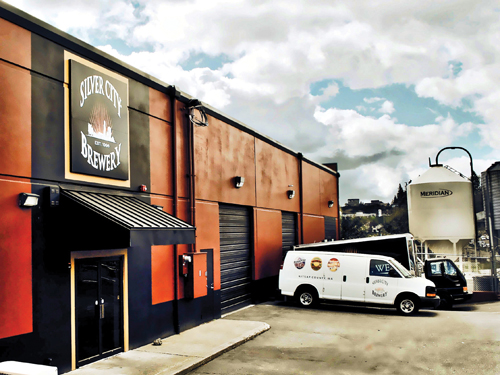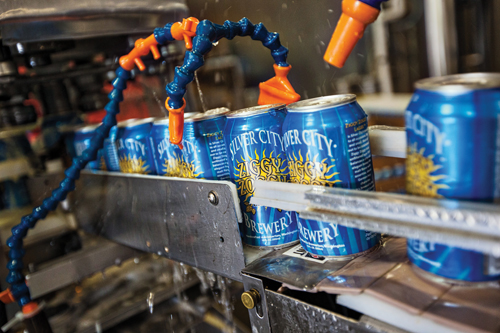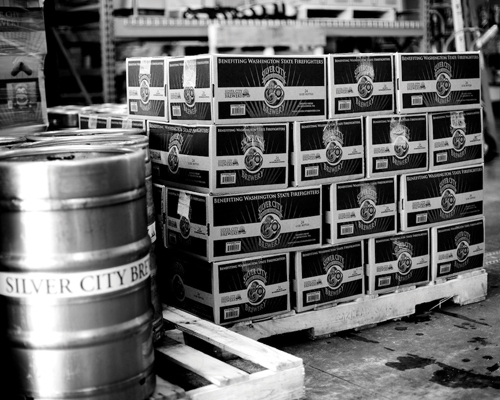
Washington State in the U.S. has an abundance of hop farms, several cities known as bona fide craft beer destinations, and one of America’s best brewery restaurants care of Silver City Brewery. At least that’s what more than a few people seem to think. It has won numerous “best of” awards both locally and nationally, and the beers themselves have garnered serious recognition from consumers and judges alike.
Such success and subsequent demand convinced owners/brothers Scott and Steve Houmes to open a large production facility in 2010, making the beers more widely available, including in Japan. This past Spring, we caught up with Scott and brewmaster Don Spencer to ask them about their life-business.
Scott and Steve, at their father’s encouragement, started out in the restaurant business in 1990, but realized after several years that craft beer was their calling. Steve had already developed a passion for craft beer through earlier employment at McMenamins, an interesting company founded by another pair of brothers in Oregon that runs brewpubs, historic hotels, movie theaters and other fun, kindred businesses.
Scott recounts that he and Steve entered the craft beer business in 1996 with the opening of a brewpub in Silverdale. But were they restauranteurs or brewery operators?
“I guess I think of myself as an entrepreneur,” says Scott. “I’m someone who likes to do something right and be proud of what I do. I want to enjoy going to work. I want to enjoy the product, the service and the people I am around on a daily basis. There’s nothing better than being excited about what you’re doing.”
With an attitude so suited for craft beer, and with several years of restaurant experience, they succeeded in their venture. The brothers resisted expansion for years, but even after they started selling outside the restaurant to divert demand, there were still 45-minute waits to get in. They decided to move production offsite. In 2010, they opened a larger facility in nearby Bremerton.
“It was a business decision, but in the end, it allowed us to sell beer to a much wider spectrum of people in Washington. It also gave us the ability to grow, and we have—over four times over since then.”
Did they have any quality-control issues or other logistic problems after the shift to a larger system?
Brewmaster Don replies, “It was actually surprisingly smooth. We had done thorough planning in trying to anticipate every obstacle we might see. Luckily we didn’t move very far so we had the same water—the water is just fantastic there.”
Despite the pining of nostalgic customers for the old days, Don asserts that their beer probably improved in quality once they had a dedicated facility. The increased production also helped them grow the craft beer scene in the area.
Don traces his professional roots back to home brewing and Thomas Kemper Brewing, a famous pioneering craft brewery in that region that launched as early as 1985.
“I was fortunate in that when I first became inspired by craft beer, there was a brewery in my town. Thomas Kemper kind of put the seed in my mind that this was a possible career path. I became obsessed with beer—I wanted to learn everything I could—and I spent four years working at that brewery. I immersed myself. I read, I sampled, I continued to brew at home—every weekend, sometimes twice a weekend. When I met Scott and Steve in 1995, they shared with me their plans of turning their restaurant into a brewpub. It looked like an extraordinary opportunity for me.”
Some of the early beers Don formulated drew from his experience in home brewing, and Silver City even relied on his pilot system, which they still use for research and development at their production facility.
“As we’ve evolved, I’ve learned a great deal in my craft, but also how to keep an open mind. Many of the beers we’ve made have come from different traditions.”
These days, Don works with Scott, Steve, and others in the organization, sharing ideas for new beers. Sometimes those ideas come from the marketing side, which seems to provoke some initial resistance in Don, though he admits that on many occasions he has run with the idea and surprised himself with the results.
“Great ideas can come from different places. That’s one of the benefits of having this pilot system. And we keep a very open dialogue with our other brewers—they are allowed to experiment and follow their own inspiration, and they’ve come out with some phenomenal stuff.”
One of those experimental beers, Red Godzilla (a red IPA), was even served at the Keyaki Hiroba beer festival at the Devil Craft booth.
Does Silver City ever listen to customer request?
“Oh absolutely. We have our own list of ideas that we can’t even get to, but we’ve lived on a philosophy that you want customer feedback. It’s not all about us. At the same time, we won’t make a beer that we’re not excited about drinking.”
Silver City sources much of its ingredients locally. The water, as previously noted, is excellent. Hop farms are just over the mountains. There is even local grain that they use. So can they claim a terroir?
“I think there’s something to that,” says Scott.
Don adds, “When a lot of brewers start out, they try to emulate styles from around the world, adjusting water with minerals to suit those styles. I did it, too. I finally realized that I want our own local flavor in the beer so we don’t add anything to the water anymore. All our beers now have this distinct quality to them.”
Silver City Brewing began exporting to Japan in late 2012 via Evergreen Imports.
“We want to help the growth of craft beer in the Japanese market,” says Scott. “I visited twenty years ago and saw no craft beer, so the thought of our being there now is exciting.”


This article was published in Japan Beer Times # () and is among the limited content available online. Order your copy through our online shop or download the digital version from the iTunes store to access the full contents of this issue.



